六年级英语上册Unit5《OpenDay》教案牛津上海版(一起)
六年级上册英语同步拓展-Module2 Unit 5 Open Day 阅读写作之科普知识 牛津上海版(一起)
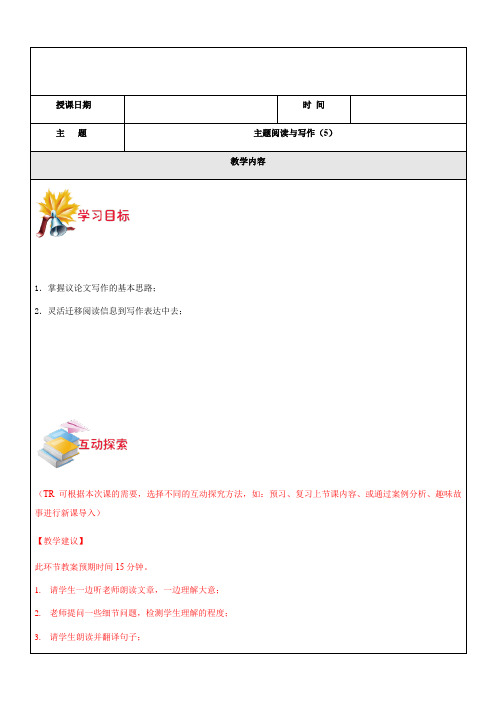
1.掌握议论文写作的基本思路;2.灵活迁移阅读信息到写作表达中去;(TR可根据本次课的需要,选择不同的互动探究方法,如:预习、复习上节课内容、或通过案例分析、趣味故事进行新课导入)【教学建议】此环节教案预期时间15分钟。
1.请学生一边听老师朗读文章,一边理解大意;2.老师提问一些细节问题,检测学生理解的程度;3.请学生朗读并翻译句子;此环节教案预期时间60分钟;教学建议:1. 让学生带着后面的问题在限定的时间6分钟内完成每篇文章的阅读;2. 读完提问学生简单复述故事;3. 让学生划出每篇文章至少三句好词好句,并分享;4. 选择与回答问题,要求学生养成划出关键句的习惯;Topic Reading———ScienceA science book gives facts. Some science books tell us about animals. Some tell us about plants.Some tell us about outer space. This page tells us about animals.Do you know that not only the fish but also some animals live in the sea? For example, the whale is not a fish. It can't breathe in the water. It swims in the water. But it comes up for air.The blue whale is the world's biggest animal. There are other sea animals, too. One is called the dolphin. Dolphins need air to live. They breathe air, as whales do. Dolphins are very clever. They sometimes seem to speak to each other.Exercise( ) 1. The passage mainly tells us about _______.A. fishesB. plantsC. scienceD. sea animals( ) 2. What food do seals and otters like eating?A. Only smaller fish.B. Only sea plants.C. Smaller fish and sea plants.D. Blue whales and dolphins.( ) 3. Some sea animals can keep themselves warm because_______.A. they are big animals(A)此环节教案预期时间20(练题)+15(互动讲解)分钟。
新牛津上海版一起六年级上册unit 5《open day》优秀教案(重点资料).doc
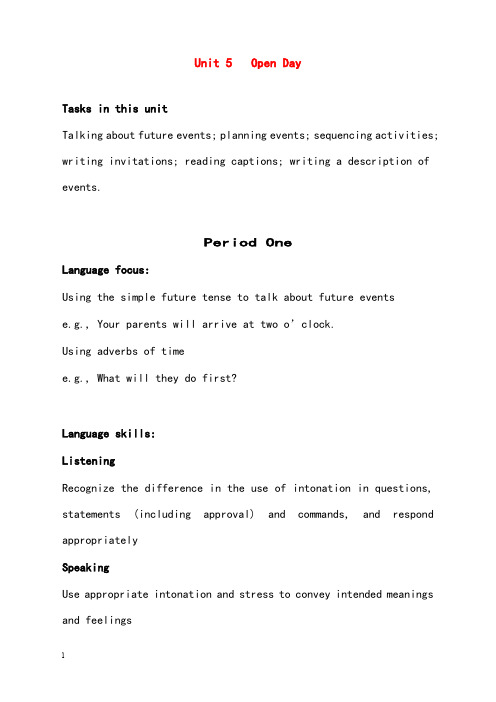
Unit 5 Open DayTasks in this unitTalking about future events; planning events; sequencing activities; writing invitations; reading captions; writing a description of events.Period OneLanguage focus:Using the simple future tense to talk about future eventse.g., Your parents will arrive at two o’clock.Using adverbs of timee.g., What will they do first?Language skills:ListeningRecognize the difference in the use of intonation in questions, statements (including approval) and commands, and respond appropriatelySpeakingUse appropriate intonation and stress to convey intended meanings and feelingsReadingRead written language in meaningful chunksWritingDevelop written texts by expressing own ideasMaterials:1.Student’s Book 6A page 322.Workbook 6A pages 28 and 293.Cassette 6A4.Cassette playerPre-task preparationAsk the students: What do we do on Open Day? What do parents do? Write a list on the board as the students mention activities. Play the cassette for Look and learn. The students repeat. While-task procedure1.Give the students time to read Look and read silently.2.Play the cassette. The students follow in their books.3.In groups of six, students practise the dialogue. Selectgroups to read the dialogue.4.In pairs, students complete the programme with the correcttime.5.Ask questions about the programme: e.g., What time will theparents arrive? What will they do first/next/then/after that/ finally? When?6.Select other groups to read the dialogue.7.Ask further questions: e.g., Where will they meet theirparents? What will they look at in the classroom and Arts and Crafts room> What will they do in the hall? What will they look at in the library? What will they have in the Music room? 8.Consolidation:Workbook 6a page 28-29Period TwoLanguage focus:Using the simple future tense to talk about future eventse.g., I’ll be in classroom 6ALanguage skills:ListeningListen for specific informationSpeakingMaintain an interaction by agreeingReadingRead written language in meaningful chunksMaterials:1.Student’s Book 6A page 332.Workbook 6A pages 313.Cassette 6A4.Cassette playerPre-task preparationReview: ground/ first/second/third/ floor. Ask: Where is the library/hall/ Arts and Crafts room? To elicit: e.g., It’s on the first floor.While-task procedure1. Give the students time to look at the floor plan of the school. Ask individual students to read the names of the rooms. Ask: Where is the Arts and Crafts room? To elicit: It’s on the third floor.2. Play the cassette for Look and Listen. The students listen. Ask: Where will kitty be? To elicit: She’ll be in the Arts and Crafts room.3. Select students to be Kitty, Peter, Alice and Jill. Ask: Where will you be, Kitty? To elicit: I’ll be on the third floor.4. In pairs, students practise Ask and answer.5. Workbook 6A page 31a. Give the students time to look at the pictures.b. Play the cassette. The students listen and match.ConsolidationWorkbook 6A page 32Period ThreeLanguage focus:Using the simple future tense to talk about future eventse.g., What will our parents do first?Using formulaic expressions to begin and end a lettere.g., Dear…; YoursLanguage skills:ListeningIdentify details that support a main ideaSpeakingMaintain an interaction by replyingReadingRecognize format and language features when reading non-narrative textsWritingDevelop written texts by using appropriate format, conventions and language featuresMaterials:1.Student’s Book 6A page 342.Workbook 6A pages 32, 343.Cassette 6A4.Cassette playerPre-task preparationTalk about invitations. Ask: When do you send invitations? To elicit: e.g., for a birthday party. Try to get the students to mention other occasions.While-task procedure1. Read the outline of the dialogue in Plan and speak.Ask the students to suggest a list of five activities. Write them on the board.2. In pairs, students decide on the activities and complete theprogramme. They then practice the dialogue.3. Ask individual students about their programme using the questions in Plan and speak. q5 The students complete Read an write. Ask one or two students to read their completed reports.4.Give students time to read Read, think and write. In groups, students discuss how to complete the invitation. Ask a representative from each group to rea their invitation.5.The students write the invitation to their parents. Askindividual students to read their invitations.ConsolidationWorkbook 6A pages 32, 34Period FourLanguage focus:Using the simple past tense to talk about past activitiese.g., The parents arrived at Rose Garden School at two o’clock.Language skills:ListeningListen for specific informationSpeakingMaintain an interaction by replyingReadingIdentify details that support a main ideaWritingDevelop written texts by presenting main and supporting ideas Materials:1.Student’s Book 6A page 352.Cassette 6A3.Cassette playerPre-task preparationIntroduce the past forms of the verbs on this page. Write the verbs on the board; arrive- arrived; visit- visited; look-looked; listen- listened; have- had.Ask: What time did you arrive at school? To elicit: e.g., I arrived at school at eight o’clock. Continue with: When did you visit your grandparents? When did you look at the noticeboard? What time did you have your breakfast?While-task procedure1 Give the students time to look at the pictures in Read and Match.2 Play the cassette. The students listen. Play the cassette again. The students repeat.3. In pairs, students match the pictures and sentences. Ask individual students to read a sentence in the correct order.ConsolidationCopy the new wordsRecite the passage.。
六年级上册英语教案-Unit 5《Open Day》 |牛津上海版
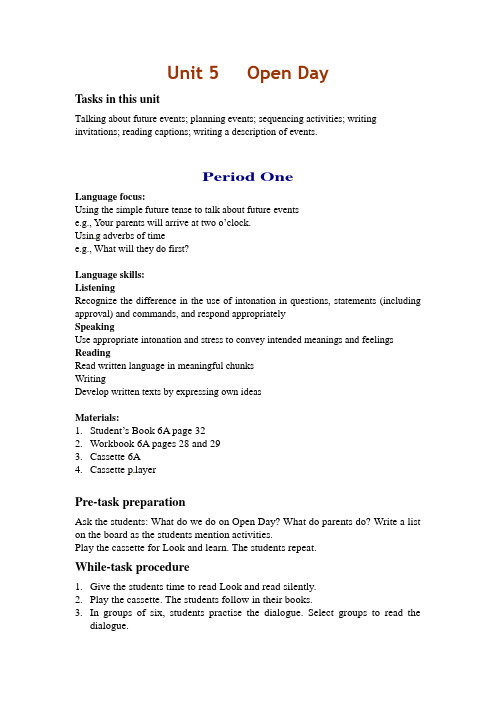
Unit 5 Open DayTasks in this unitTalking about future events; planning events; sequencing activities; writing invitations; reading captions; writing a description of events.Period OneLanguage focus:Using the simple future tense to talk about future eventse.g., Your parents will arrive at two o’clock.Usin g adverbs of timee.g., What will they do first?Language skills:ListeningRecognize the difference in the use of intonation in questions, statements (including approval) and commands, and respond appropriatelySpeakingUse appropriate intonation and stress to convey intended meanings and feelings ReadingRead written language in meaningful chunksWritingDevelop written texts by expressing own ideasMaterials:1.Student’s Book 6A page 322.Workbook 6A pages 28 and 293.Cassette 6A4.Cassette p layerPre-task preparationAsk the students: What do we do on Open Day? What do parents do? Write a list on the board as the students mention activities.Play the cassette for Look and learn. The students repeat.While-task procedure1.Give the students time to read Look and read silently.2.Play the cassette. The students follow in their books.3.In groups of six, students practise the dialogue. Select groups to read thedialogue.4.In pairs, students complete the programme with the correct time.5.Ask questions about the programme: e.g., What time will the parents arrive?What will they do first/next/then/after that/ finally? When?6.Select other groups to read the dialogue.7.Ask further questions: e.g., Where will they meet their parents? What willthey look at in the classroom and Arts and Crafts room> What will they do in the hall? What will they look at in the library? What will they have in the Music room?8.Consolidation:Workbook 6a page 28-29Period TwoLanguage focus:Using the simple future tense to talk about future eventse.g., I’ll be in classroom 6ALanguage skills:ListeningListen for specific informationSpeakingMaintain an interaction by agreeingReadingRead written language in meani ngful chunksMaterials:1.Student’s B ook 6A page 332.Workbook 6A pages 313.Cassette 6A4.Cassette playerPre-task preparationReview: ground/ first/second/third/ floor. Ask: Where is the library/hall/ Arts and Crafts room? To elicit: e.g., It’s on the first floor.While-task procedure1. Give the students time to look at the floor plan of the school. Ask individualstudents to read the names of the rooms. Ask: Where is the Arts and Crafts room? To elicit: It’s on the third floor.2. Play the cassette for Look and Listen. The students listen. Ask: Where will kitty be? To elicit: She’ll be in the Arts and Cra fts room.3. Select students to be Kitty, Peter, Alice and Jill. Ask: Where will you be, Kitty? To elicit: I’ll be on the third floor.4. In pairs, students practise Ask and answer.5. Workbook 6A page 31a. Give the students time to look at the pictures.b. Play the cassette. The students listen and matc h.ConsolidationWorkbook 6A page 32Period ThreeLanguage focus:Using the simple future tense to talk about fut ure eventse.g., What will our parents do first?Using formulaic expressions to begin and end a lettere.g., Dear…; YoursLanguage skills:ListeningIdentify details that support a main ideaSpeakingMaintain an interaction by replyingReadingRecognize format and language features when reading non-narrative texts WritingDevelop written texts by using appropriate format, conventions and language featuresMaterials:1.Student’s Book 6A page 342.Workbook 6A pages 32, 343.Cassette 6A4.Cassette playerPre-task preparationTalk about invitations. Ask: When do you send invitations? To elicit: e.g., for a birthday party. Try to get the students to mention other occasions.While-task procedure1. Read the outline of the dialogue in Plan and speak.Ask the students to suggest a list of five activities. Write them on the board.2. In pairs, students decide on the activities and complete the programme. They then practice the dialogue.3. Ask individual students about their programme using the questions in Plan and speak. q5 The students complete Read an write. Ask one or two students to read their completed reports.4.Give students time to read Read, thi nk and write. In groups, students discuss how to complete the invitation. Ask a representative from each group to rea their invitation.5.The students write the invitation to their parents. Ask individual students to readtheir invitations.ConsolidationWorkbook 6A pages 32, 34Period FourLanguage focus:Using the simple past tense to talk about past activitiese.g., The parents arrived at Rose Garden Schoo l at two o’clock.Language skills:ListeningListen for specific informationSpeakingMaintain an interaction by replyingReadingIdentify details that support a main ideaWritingD evelop written texts by presenting main and supporting ideasMaterials:1.Student’s Book 6A page 352.Cassette 6A3.Cassette playerPre-task preparationIntroduce the past forms of the verbs on this page. Write the verbs on the board; arrive- arrived; visit- visited; look-looked; listen- listened; have- had.Ask: What time did you arrive at school? To elicit: e.g., I arrived at school at eight o’clock. Continue with: When did you visit your grandparents? When did you look at the noticeboard? What time did you have your breakfast?While-task procedure1 Give the students time to look at the pictures in Read and Match.2 Play the cassette. The students listen. Play the cassette again. The students repeat.3. In pairs, students match the pictures and sentences. Ask individual students to reada sentence in the correct order.ConsolidationCopy the new wordsRecite the passage.。
六年级英语上册Unit5《OpenDay》学案(无答案)牛津上海版(一起)

Unit 5 Open DayLife is not just being alive, but being well.生活不是为了活着,而是为了活得更精彩.Learning aims:学习目标学习用一般将来时态来计划一件即将发生的事Learning focus and difficulty: 学习重难点用一般将来时态来计划一件即将发生的事Learning procedures:学习过程预习指导A good beginning is half done.良好的开始是成功的一半。
一、单词预习课文P33, 将下列词、词组组在文中找出来。
音标词性意思ground ______________ ______ ___________二、词组1. 想要某人做某事 _________________2.欢迎父母 _______________________3. 在不同的地方 ____________________4. 在开放日那天 ____________________5. 教师办公室 ______________________6. 在6A教室 ______________________7. 在音乐教室 _____________________8. 在大厅__________________________9. 在三楼 _________________________(英式英语)10.在一楼__________________________(英式英语)当堂导测Strike while the iron is hot. 乘热打铁一、选择正确答案( ) 1. Our classroom is _________ floor.A. on the fourthB. at the fourthC. on fourthD. at fourth ( ) 2. Jason does exercise in a _________ every day.A. music roomB. libraryC. gymD. toilet( ) 3. Tom wants me _________ a model ship for him.A. makeB. makesC. makingD. to make( ) 4. I must go to the __________ office now.A. teacher’sB. teacherC. teachers’D. teachers( )5._________ two playgrounds, a hall and a garden in our school.A. There hasB. There haveC. There isD. There are二、用所给单词的适当形式填空1. Here is an _________ (enter) to the hall.2. Which _________ (sing) do you like better, Jolin or Cicy?3. I want my parents ___________ (buy) me a new bicycle.4. I like __________ (difference) kinds of food.5. On the ________ (one) floor, there is a clinic.6. __________(final), I got A in the exam.7. They are _________ (plan) a visit to Beijing now.8. I like ________ (watch) a basketball matches at weekends.反馈练习Practice makes perfect.熟能生巧选择正确的答案( ) 1. ________ a concert next Saturday?A. There will beB. Will there beC. There can beD. There are ( ) 2. He ________ her a beautiful hat on her next birthday.A. givesB. gaveC. will givingD. is going to giving ( ) 3. He ________ in three days.A. coming backB. came backC. will come backD. is going to coming back( ) 4. – Will his parents go to see the Terra Cotta Warriors tomorrow?– No, ________.A. they willn’t.B. they won’t.C. they aren’t.D. they don’t.( ) 5. We ________ the work this way next time.A. doB. will doC. going to doD. will doing( ) 6. Tomorrow he ________ a kite in the open air first, and then ________ boating in the park.A. will fly; will goB. will fly; goesC. is going to fly; will goesD. flies; will go。
六年级英语上册Unit5OpenDay课件3牛津上海版一起0104124

Look and review
Some photos of the Open Day.
_2_4__O_c_to_b_e_r_ (date)
Open Day at Rose Garden School
Yesterday was Open Day at Rose Garden School. Our parents
__A_f_te_r_t_h_a_t, they l_o_o_k_e_d at the
English Club noticeboard in the
library on the s_e_c_o_n_d floor at _fo_u_r_o_’_c_lo_c_k.
_F_in_a_ll_y, they _h_a_d___ tea and
OpeБайду номын сангаас Day at the hospital
Yesterday was the Open Day of Sunshine hospital. Alice and Kitty went to the hospital.
Open Day Programme 9:15 arrive d at the hospital 9:30 talked to Doctor Chen 9:50 visited some sick people 10:40 ssaewe the new babies 11:25 wgeont to the restaurant for some
Time: 1.00 p.m.---4.00 p.m. Place: Sunshine Middle School
六年级上册英语课件-Module2 Unit 5 Open Day 一般过去时 牛津上海版(一起)
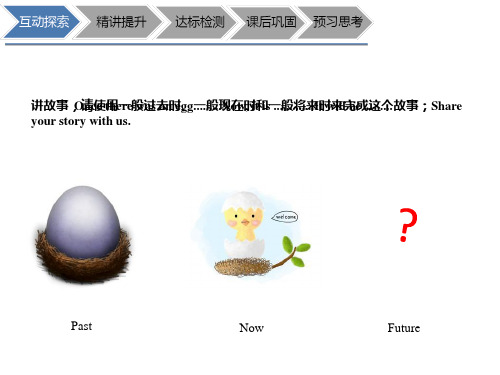
Future Past
Now
一般过去时表示在过去 发生的动作或存在的状态
一般过去时常与表示过 比如:目暮警官你昨天 去的时间状语: 去旅行了。 yesterday, last (Monday) 等连用 。 毛利老弟,什么是一般过去时?
来看看一般过去时下动词的变化 ②以不发音字母 e结尾→词 规律 ①一般情况→词尾+ed 尾+d pull-pulled taste-tasted
讲故事,请使用一般过去时、一般现在时和一般将来时来完成这个故事; Share Once there was an egg.........Now, it is .............It will be ......... your story with us.
Past
Now
Future
讲故事,请使用一般过去时、一般现在时和一般将来时来完成这个故事;Share Once there was an egg.........Now, it is .............It will be ......... your story with us.
一般疑问句: 1) to be, there be (“be类句型”)句型:直接将be动词 提前 2)to do句型: Did +主语+do…..? 回答:Yes 或 No。
特殊疑问句: 特殊疑问词(wh-/how)+一般疑问句….?
lived (live) in Shanghai three months ago. 1.That man ______
1. 复习精讲提升部分 的内容; 2. 请在规定时间内完 成讲义中的课后巩固 部分。
下节课和同学们介绍一下你待过的地方和讨论你们想去哪个地方?
牛津版上海版六年级上册 Unit 5 Open Day 说课稿

牛津版上海版六年级上册 Unit 5 Open Day 说课稿一. 教材分析牛津版上海版六年级上册Unit 5 Open Day的主题是关于学校开放日。
本单元通过描述学校开放日当天的活动,让学生学会用英语询问和描述时间、地点、活动等。
教材内容丰富,插图生动,贴近学生生活,能激发学生的学习兴趣。
本单元主要语言点包括一般现在时的用法、频度副词、时间状语以及询问和描述活动的表达方式。
二. 学情分析六年级的学生已经掌握了英语学习的基本语法和词汇,具备一定的听说读写能力。
他们在学习本单元时,已有的知识储备和经验将对学习起到积极的促进作用。
然而,学生对于一般现在时的用法、频度副词以及时间状语的掌握程度不一,需要在教学中加以引导和巩固。
此外,部分学生可能在描述活动时词汇选择和句子上存在困难,需要教师给予更多的关注和指导。
三. 说教学目标1.知识目标:(1)学会描述学校开放日当天的活动。
(2)掌握一般现在时的用法、频度副词、时间状语。
2.能力目标:(1)能够用英语询问和描述时间、地点、活动等。
(2)提高学生的听说读写能力,培养良好的英语学习习惯。
3.情感目标:(1)培养学生热爱学校、积极参与学校活动的情感。
(2)增强学生自信心,提高他们用英语表达自己的能力。
四. 说教学重难点1.教学重点:(1)描述学校开放日当天的活动。
(2)运用一般现在时、频度副词、时间状语进行表达。
2.教学难点:(1)一般现在时的用法。
(2)频度副词、时间状语的运用。
(3)描述活动时词汇选择和句子。
五. 说教学方法与手段1.教学方法:(1)任务型教学法:通过完成各种任务,让学生在实践中学会用英语描述活动。
(2)情境教学法:创设学校开放日的情境,让学生在真实的环境中学习英语。
(3)分组合作学习:培养学生团队合作精神,提高口语表达能力。
2.教学手段:(1)多媒体课件:利用课件展示学校开放日的图片、视频等,丰富教学内容,激发学生兴趣。
(2)实物道具:使用实物道具如门票、宣传册等,让学生更直观地了解学校开放日。
六年级英语上册 Unit 5《Open Day》教案 牛津上海版(一起)

Unit 5 Open DayTasks in this unitTalking about future events; planning events; sequencing activities; writing invitations; reading captions; writing a description of events.Period OneLanguage focus:Using the simple future tense to talk about future eventse.g., Your parents will arrive at two o’clock.Using adverbs of timee.g., What will they do first?Language skills:ListeningRecognize the difference in the use of intonation in questions, statements (including approval) and commands, and respond appropriatelySpeakingUse appropriate intonation and stress to convey intended meanings and feelings ReadingRead written language in meaningful chunksWritingDevelop written texts by expressing own ideasMaterials:1.Student’s Book 6A page 322.Workbook 6A pages 28 and 293.Cassette 6A4.Cassette playerPre-task preparationAsk the students: What do we do on Open Day? What do parents do? Write a list on the board as the students mention activities.Play the cassette for Look and learn. The students repeat.While-task procedure1.Give the students time to read Look and read silently.2.Play the cassette. The students follow in their books.3.In groups of six, students practise the dialogue. Select groups to read thedialogue.4.In pairs, students complete the programme with the correct time.5.Ask questions about the programme: e.g., What time will the parents arrive?What will they do first/next/then/after that/ finally? When?6.Select other groups to read the dialogue.7.Ask further questions: e.g., Where will they meet their parents? What willthey look at in the classroom and Arts and Crafts room> What will they do in the hall? What will they look at in the library? What will they have in the Music room?8.Consolidation:Workbook 6a page 28-29Period TwoLanguage focus:Using the simple future tense to talk about future eventse.g., I’ll be in classroom 6ALanguage skills:ListeningListen for specific informationSpeakingMaintain an interaction by agreeingReadingRead written language in meaningful chunksMaterials:1.Student’s Book 6A page 332.Workbook 6A pages 313.Cassette 6A4.Cassette playerPre-task preparationReview: ground/ first/second/third/ floor. Ask: Where is the library/hall/ Arts and Crafts room? To elicit: e.g., It’s on the first floor.While-task procedure1. Give the students time to look at the floor plan of the school. Ask individual students to read the names of the rooms. Ask: Where is the Arts and Crafts room? To elicit: It’s on the third floor.2. Play the cassette for Look and Listen. The students listen. Ask: Where will kitty be? To elicit: She’ll be in the Arts and Crafts room.3. Select students to be Kitty, Peter, Alice and Jill. Ask: Where will you be, Kitty? To elicit: I’ll be on the third floor.4. In pairs, students practise Ask and answer.5. Workbook 6A page 31a. Give the students time to look at the pictures.b. Play the cassette. The students listen and match.ConsolidationWorkbook 6A page 32Period ThreeLanguage focus:Using the simple future tense to talk about future eventse.g., What will our parents do first?Using formulaic expressions to begin and end a lettere.g., Dear…; YoursLanguage skills:ListeningIdentify details that support a main ideaSpeakingMaintain an interaction by replyingReadingRecognize format and language features when reading non-narrative texts WritingDevelop written texts by using appropriate format, conventions and language featuresMaterials:1.Student’s Book 6A page 342.Workbook 6A pages 32, 343.Cassette 6A4.Cassette playerPre-task preparationTalk about invitations. Ask: When do you send invitations? To elicit: e.g., for a birthday party. Try to get the students to mention other occasions.While-task procedure1. Read the outline of the dialogue in Plan and speak.Ask the students to suggest a list of five activities. Write them on the board.2. In pairs, students decide on the activities and complete the programme. They then practice the dialogue.3. Ask individual students about their programme using the questions in Plan and speak. q5 The students complete Read an write. Ask one or two students to read their completed reports.4.Give students time to read Read, think and write. In groups, students discuss how to complete the invitation. Ask a representative from each group to rea their invitation.5.The students write the invitation to their parents. Ask individual students toread their invitations.ConsolidationWorkbook 6A pages 32, 34Period FourLanguage focus:Using the simple past tense to talk about past activitiese.g., The parents arrived at Rose Garden School at two o’clock.Language skills:ListeningListen for specific informationSpeakingMaintain an interaction by replyingReadingIdentify details that support a main ideaWritingDevelop written texts by presenting main and supporting ideasMaterials:1.Student’s Book 6A page 352.Cassette 6A3.Cassette playerPre-task preparationIntroduce the past forms of the verbs on this page. Write the verbs on the board; arrive- arrived; visit- visited; look-looked; listen- listened; have- had. Ask: What time did you arrive at school? To elicit: e.g., I arrived at school at eight o’clock. Continue with: When did you visit your grandparents? When did you look at the noticeboard? What time did you have your breakfast?While-task procedure1 Give the students time to look at the pictures in Read and Match.2 Play the cassette. The students listen. Play the cassette again. The students repeat.3. In pairs, students match the pictures and sentences. Ask individual students to read a sentence in the correct order.ConsolidationCopy the new wordsRecite the passage.。
牛津英语上海版六年级上册Module2Unit5OpenDay3课时英文教案
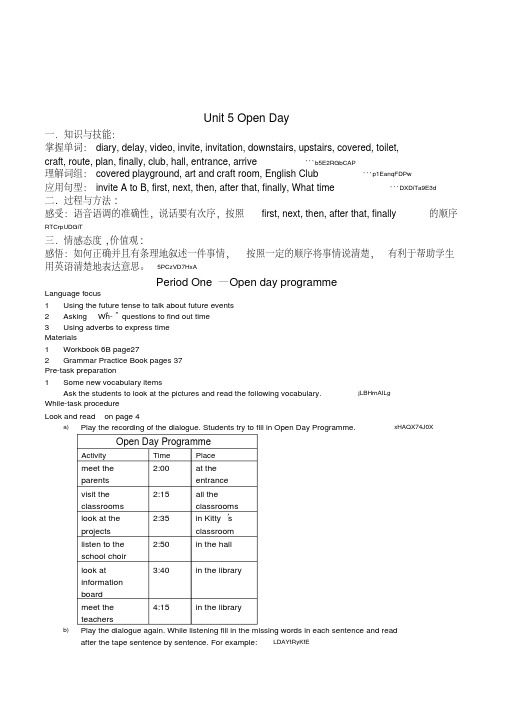
Unit 5 Open Day一.知识与技能:掌握单词:diary, delay, video, invite, invitation, downstairs, upstairs, covered, toilet,craft, route, plan, finally, club, hall, entrance, arrive…b5E2RGbCAP理解词组:covered playground, art and craft room, English Club…p1EanqFDPw应用句型:invite A to B, first, next, then, after that, finally, What time…DXDiTa9E3d 二. 过程与方法:感受:语音语调的准确性,说话要有次序,按照first, next, then, after that, finally的顺序RTCrpUDGiT三.情感态度,价值观:感悟:如何正确并且有条理地叙述一件事情,按照一定的顺序将事情说清楚,有利于帮助学生用英语清楚地表达意思。
5PCzVD7HxAPeriod One—Open day programmeLanguage focus1Using the future tense to talk about future events2Asking “Wh-” questions to find out time3Using adverbs to express timeMaterials1Workbook 6B page272Grammar Practice Book pages 37Pre-task preparation1Some new vocabulary itemsAsk the students to look at the pictures and read the following vocabulary.jLBHrnAILgWhile-task procedureLook and read on page 4a) Play the recording of the dialogue. Students try to fill in Open Day Programme.xHAQX74J0XOpen Day ProgrammeActivity Time Placemeet the parents 2:00 at theentrancevisit the classrooms 2:15 all theclassroomslook at the projects 2:35 in Kitty’sclassroomlisten to theschool choir2:50 in the halllook atinformationboard3:40 in the librarymeet theteachers4:15 in the libraryb) Play the dialogue again. While listening fill in the missing words in each sentence and readafter the tape sentence by sentence. For example:LDAYtRyKfE。
牛津上海版六年级上册英语 Unit 5 Open day 讲义

Unit5 Open day同步教案课本单词1. programme n. 活动安排2. entrance n. 入口处3. choir n. 合唱队4. noticeboard n. 布告栏5. parent n. 父或母6. arrive v. 到达7. first adv. 首先8. classroom n. 教室9. next adv. 紧挨着;随后10. project n. 习作项目11. craft n. 工艺12. club n. 俱乐部13. finally adv. 最后14. ground n. 地;地面15. invitation n. 请柬16. yesterday n. 昨天Ⅰ. Important words and phrases:Words:1. entrance n. 入口______________________ 在入口处【联想】___________ v. 进入enter some place=go/walk/come into some place进入某地He enters the room quietly.= He walks into the room quietly.他安静地进入了房间。
2. n. 信息板You can find a lot of information___________________________. 你能在信息板上找到很多信息。
3. plan(1) v. 计划★_________________________ 计划做某事We plan to have a meeting next week。
我们计划下周开个会。
★plan sth. 计划某事They are planning a meeting. 他们正在计划一次会议。
(2) n. 计划__________________________________ ? 你们有假期计划了吗?4. arrive in, arrive at, get to和reach四者都可以表示“到达”;arrive in后接“较大的地方”,arrive at后接“较小的地方”,get to和reach后直接加宾语。
六年级上册英语教案-Unit 5Open Day 牛津上海版
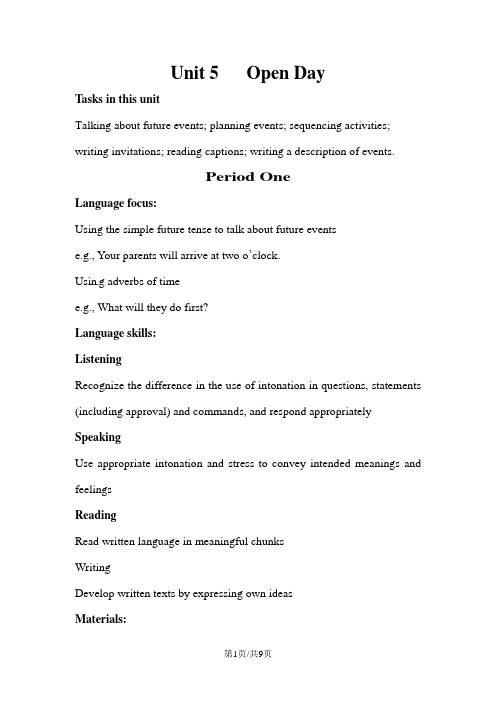
Unit 5 Open DayTasks in this unitTalking about future events; planning events; sequencing activities; writing invitations; reading captions; writing a description of events.Period OneLanguage focus:Using the simple future tense to talk about future eventse.g., Your parents will arrive at two o’clock.Usin g adverbs of timee.g., What will they do first?Language skills:ListeningRecognize the difference in the use of intonation in questions, statements (including approval) and commands, and respond appropriately SpeakingUse appropriate intonation and stress to convey intended meanings and feelingsReadingRead written language in meaningful chunksWritingDevelop written texts by expressing own ideasMaterials:1.Student’s Book 6A page 322.Workbook 6A pages 28 and 29[来源:]3.Cassette 6A4.Cassette p layerPre-task preparationAsk the students: What do we do on Open Day? What do parents do? Write a list on the board as the students mention activities.Play the cassette for Look and learn. The students repeat.While-task procedure1.Give the students time to read Look and read silently.2.Play the cassette. The students follow in their books.3.In groups of six, students practise the dialogue. Select groups toread the dialogue.4.In pairs, students complete the programme with the correct time.5.Ask questions about the programme: e.g., What time will theparents arrive? What will they do first/next/then/after that/ finally?When?6.Select other groups to read the dialogue.[来源:ZXXK]7.Ask further questions: e.g., Where will they meet their parents?What will they look at in the classroom and Arts and Crafts room> What will they do in the hall? What will they look at in the library?What will they have in the Music room?Consolidation:Workbook 6a page 28-29[来源:]Period TwoLanguage focus:Using the simple future tense to talk about future eventse.g., I’ll be in classroom 6ALanguage skills:ListeningListen for specific informationSpeakingMaintain an interaction by agreeingReadingRead written language in meani ngful chunksMaterials:1.Student’s Book 6A page 332.Workbook 6A pages 313.Cassette 6A4.Cassette playerPre-task preparationReview: ground/ first/second/third/ floor. Ask: Where is the library/hall/ Arts and Crafts room? To elicit: e.g., It’s on the first floor.While-task procedure1. Give the students time to look at the floor plan of the school. Ask individual students to read the names of the rooms. Ask: Where is the Arts and Crafts room? To elicit: It’s on the third floor.2. Play the cassette for Look and Listen. The students listen. Ask: Where will kitty be? To elicit: She’ll be in the Arts and Crafts room.3. Select students to be Kitty, Peter, Alice and Jill. Ask: Where will you be, Kitty? To elicit: I’ll be on the third floor.4. In pairs, students practise Ask and answer.5. Workbook 6A page 31a. Give the students time to look at the pictures.b. Play the cassette. The students listen and match.ConsolidationWorkbook 6A page 32Period ThreeLanguage focus:Using the simple future tense to talk about fut ure eventse.g., What will our parents do first?Using formulaic expressions to begin and end a lettere.g., Dear…; YoursLanguage skills:ListeningIdentify details that support a main ideaSpeakingMaintain an interaction by replyingReadingRecognize format and language features when reading non-narrative textsWritingDevelop written texts by using appropriate format, conventions and language features[来源:ZXXK]Materials:1.Student’s Book 6A page 342.Workbook 6A pages 32, 343.Cassette 6A4.Cassette playerPre-task preparationTalk about invitations. Ask: When do you send invitations? To elicit: e.g., for a birthday party. Try to get the students to mention other occasions. While-task procedure1. Read the outline of the dialogue in Plan and speak.Ask the students to suggest a list of five activities. Write them on the board.2. In pairs, students decide on the activities and complete the programme.They then practice the dialogue.3. Ask individual students about their programme using the questions in Plan and speak. q5 The students complete Read an write. Ask one or two students to read their completed reports.4.Give students time to read Read, think and write. In groups, students discuss how to complete the invitation. Ask a representative from each group to rea their invitation.5.The students write the invitation to their parents. Ask individualstudents to read their invitations.ConsolidationWorkbook 6A pages 32, 34Period FourLanguage focus:Using the simple past tense to talk about past activitiese.g., The parents arrived at Rose Garden Schoo l at two o’clock. Language skills:ListeningListen for specific informationSpeakingMaintain an interaction by replyingReadingIdentify details that support a main ideaWritingDevelop written texts by presenting main and supporting ideas Materials:[来源:学+科+网Z+X+X+K]1.Student’s Book 6A page 352.Cassette 6A3.Cassette playerPre-task preparationIntroduce the past forms of the verbs on this page. Write the verbs on the board; arrive- arrived; visit- visited; look-looked; listen- listened; have- had.Ask: What time did you arrive at school? To elicit: e.g., I arrived at school at eight o’clock. Continue with: When did you visit your grandparents? When did you look at the noticeboard? What time did you have your breakfast?While-task procedure1 Give the students time to look at the pictures in Read and Match.2 Play the cassette. The students listen. Play the cassette again. The students repeat.3. In pairs, students match the pictures and sentences. Ask individual students to read a sentence in the correct order.宋以后,京师所设小学馆和武学堂中的教师称谓皆称之为“教谕”。
上海市小学六年级第一学期英语(牛津上海版)教材同步PPT教案单词快乐记忆课件:Module 2 Unit 5 Open Day

提示:本演示文稿采用Microsoft office PowerPoint 2013 制作,PPT动画特效在其他软件播放可能出现失真。
构成:pro+gram+m+e=programme pro-: 前缀:在前;向前
gram: 词根:表示写,画
“在前面写好”→“计划;提纲”
词组:Teaching Programme 教学大纲;教学计划 nuclear programme 核计划
来源:源自拉丁语的finalis,意为极限,末尾。
来源:源自古英语grund, 意为底部,尤指海底, 现 词义通用化。
词组: on the ground 在地上 in the ground 在地下(掩埋着的);在土里
构成:invit+ation=invitation invit: 来自单词invite,邀请,招致。 -ation: 名词后缀
构成:entr+ance=entrance entr: 来自单词enter, 进入
-ance: 名词后缀
词组: main entrance 大门;正门 entrance examination 入学考试
来源:源自来自希腊语khoros(舞蹈队),原本指的 是古希腊悲剧中的舞蹈队。在古希腊悲剧中,khoros (舞蹈队)原本仅仅负责舞蹈,后来为了表达戏剧中 的情感而增加了合唱功能,因此khoros增加了“合唱 队”的含义。choir常用来特指教堂里的合唱队,即所 谓的“唱诗班”。
来源:源自古英语 cræft,原义为“力量,强健”现词 义主要为工艺,技术。
词组:art and craft 手工艺 craft product 工艺品
来源:源自古英语的clubbe,意为一团人,一群人。
六年级英语上册 Unit 5 Open Day课件3 牛津上海版(一

_t_h_ir_d_ floor with the teachers at _fo_u_r_t_w_e_n_t_y_-f_iv. e
Our parents had a great time!
Kitty Li
Opeபைடு நூலகம் Day of our school
Open Day at the hospital
Yesterday was the Open Day of Sunshine hospital. Alice and Kitty went to the hospital.
Open Day Programme 9:15 arrive d at the hospital 9:30 talked to Doctor Chen 9:50 visited some sick people 10:40 ssaewe the new babies 11:25 wgeont to the restaurant for some
Yesterday was our school Open Day.
The parents arrived at school at 1.00 p.m. First,…,Next,… Then,…,After that,…,Finally…
Homework
To write the article about the Open Day at the hospital
on the third floor at _tw__o_t_h_ir_ty___.
_T_h_e_n_ they _li_st_e_n_ed to the school choir in the hall on the __fir_s_t_ floor at _t_h_r_ee__t_e_n.
牛津上海版(一起)六上Unit 5《Open Day》word教案

Unit 5 Open DayTasks in this unitTalking about future events; planning events; sequencing activities; writing invitations; reading captions; writing a description of events.Period OneLanguage focus:Using the simple future tense to talk about future eventse.g., Your parents will arrive at two o’clock.Using adverbs of timee.g., What will they do first?Language skills:ListeningRecognize the difference in the use of intonation in questions, statements (including approval) and commands, and respond appropriatelySpeakingUse appropriate intonation and stress to convey intended meanings and feelings ReadingRead written language in meaningful chunksWritingDevelop written texts by expressing own ideasMaterials:1.Student’s Book 6A page 322.Workbook 6A pages 28 and 293.Cassette 6A4.Cassette playerPre-task preparationAsk the students: What do we do on Open Day? What do parents do? Write a list on the board as the students mention activities.Play the cassette for Look and learn. The students repeat.While-task procedure1.Give the students time to read Look and read silently.2.Play the cassette. The students follow in their books.3.In groups of six, students practise the dialogue. Select groups to read thedialogue.4.In pairs, students complete the programme with the correct time.5.Ask questions about the programme: e.g., What time will the parents arrive?What will they do first/next/then/after that/ finally? When?6.Select other groups to read the dialogue.7.Ask further questions: e.g., Where will they meet their parents? What willthey look at in the classroom and Arts and Crafts room> What will they do in the hall? What will they look at in the library? What will they have in the Music room?8.Consolidation:Workbook 6a page 28-29Period TwoLanguage focus:Using the simple future tense to talk about future eventse.g., I’ll be in classroom 6ALanguage skills:ListeningListen for specific informationSpeakingMaintain an interaction by agreeingReadingRead written language in meaningful chunksMaterials:1.Student’s Book 6A page 332.Workbook 6A pages 313.Cassette 6A4.Cassette playerPre-task preparationReview: ground/ first/second/third/ floor. Ask: Where is the library/hall/ Arts and Crafts room? To elicit: e.g., It’s on the first floor.While-task procedure1. Give the students time to look at the floor plan of the school. Ask individualstudents to read the names of the rooms. Ask: Where is the Arts and Crafts room? To elicit: It’s on the third floor.2. Play the cassette for Look and Listen. The students listen. Ask: Where will kitty be? To elicit: She’ll be in the Arts and Crafts room.3. Select students to be Kitty, Peter, Alice and Jill. Ask: Where will you be, Kitty? To elicit: I’ll be on the third floor.4. In pairs, students practise Ask and answer.5. Workbook 6A page 31a. Give the students time to look at the pictures.b. Play the cassette. The students listen and match.ConsolidationWorkbook 6A page 32Period ThreeLanguage focus:Using the simple future tense to talk about future eventse.g., What will our parents do first?Using formulaic expressions to begin and end a lettere.g., Dear…; YoursLanguage skills:ListeningIdentify details that support a main ideaSpeakingMaintain an interaction by replyingReadingRecognize format and language features when reading non-narrative texts WritingDevelop written texts by using appropriate format, conventions and language featuresMaterials:1.Student’s Book 6A page 342.Workbook 6A pages 32, 343.Cassette 6A4.Cassette playerPre-task preparationTalk about invitations. Ask: When do you send invitations? To elicit: e.g., for a birthday party. Try to get the students to mention other occasions.While-task procedure1. Read the outline of the dialogue in Plan and speak.Ask the students to suggest a list of five activities. Write them on the board.2. In pairs, students decide on the activities and complete the programme. They then practice the dialogue.3. Ask individual students about their programme using the questions in Plan and speak. q5 The students complete Read an write. Ask one or two students to read their completed reports.4.Give students time to read Read, think and write. In groups, students discuss how to complete the invitation. Ask a representative from each group to rea their invitation.5.The students write the invitation to their parents. Ask individual students to readtheir invitations.ConsolidationWorkbook 6A pages 32, 34Period FourLanguage focus:Using the simple past tense to talk about past activitiese.g., The parents arrived at Rose Garden School at two o’clock.Language skills:ListeningListen for specific informationSpeakingMaintain an interaction by replyingReadingIdentify details that support a main ideaWritingDevelop written texts by presenting main and supporting ideasMaterials:1.Student’s Book 6A page 352.Cassette 6A3.Cassette playerPre-task preparationIntroduce the past forms of the verbs on this page. Write the verbs on the board; arrive- arrived; visit- visited; look-looked; listen- listened; have- had.Ask: What time did you arrive at school? To elicit: e.g., I arrived at school at eight o’clock. Continue with: When did you visit your grandparents? When did you look at the noticeboard? What time did you have your breakfast?While-task procedure1 Give the students time to look at the pictures in Read and Match.2 Play the cassette. The students listen. Play the cassette again. The students repeat.3. In pairs, students match the pictures and sentences. Ask individual students to reada sentence in the correct order.ConsolidationCopy the new wordsRecite the passage.。
六年级上册英语优质课件-Module2 Unit 5 Open Day 一般过去时牛津上海版(一起)

2.- _D_i_d_you _w_a_tc_h_(watch) TV last night? - Yes, I __d_id__(do).
3. The children did their homework after school. (对划线部分提问) Key: What did the children do after school?
Future
Pastห้องสมุดไป่ตู้Now
一般过去时表示在过去 发生的动作或存在的状态
一般过去时常与表示过 比如去:的目时暮间警状官语你:昨天 yesterd去ay旅, l行ast了(M。onday) 毛利老弟,什么是等一连般用过。去时?
来看看一般过去时下动词的变化
①一般情况→词尾+ed
②以不规发律音字母e结尾→词 尾+d
一般疑问句: 1) to be, there be (“be类句型”)句型:直接将be动词 提前
2)to do句型: Did +主语+do…..? 回答:Yes 或 No。
特殊疑问句: 特殊疑问词(wh-/how)+一般疑问句….?
1.That man __li_v_ed__ (live) in Shanghai three months ago.
are were(not)
基本的学完了,接下来我们来看看
一般过去时的基本句型构 成
肯定句:主语+ 动词的过去式 I went to my grandmother's house yesterday.
否定句:1)to be, there be..(“be类句型”)句型直接在be动词 后加not
2)主语+did not(didn’t) do……
2017年六年级英语上册 Unit 5 Open Day讲义1 牛津上海版(一起)
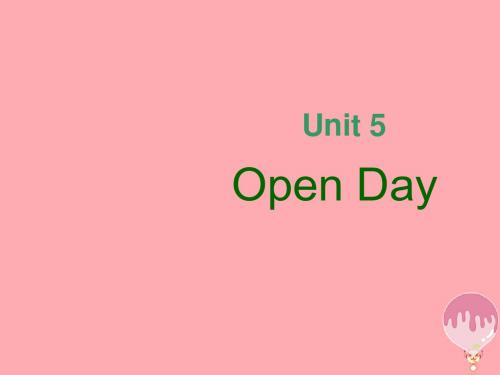
two o’clock.
2
Theywv_i_lsl_it_ve_ids_it____ our classroom at two fifteen.
3
They w_l_oi_lol_kl_eo_do_k___ at our projects at two thirty in the
Arts and Crafts room.
They visited Kitty’s classroom
They will visit our classroom
Kitty’s open day today Our open day
October 22 October 23 October 24
Kitty’s parents looked at their projects They listened to the scholl choir
s_e_co_n_d_ floor at _fo_u_r__o’_c_lo_c_k.
F_i_n_a_lly_, they __h_a_d__ tea and cakes in the Music room on the _t_h_ir_d_ floor with
the teachers at f_o_u_r_t_w_e_n_t_y_-_fi.ve
Programme for Our Trip
Who
Do what
My classmates and I
visited Animal’s World
My friends and I
visited a Spider Show
When
10:00 10:10
Miss Li and I
looked at many beautiful fish
牛津版上海版六年级上册 Unit 5 Open Day 教学设计

牛津版上海版六年级上册 Unit 5 Open Day 教学设计一. 教材分析牛津版上海版六年级上册Unit 5 Open Day的主要内容包括参观学校开放日,学习与学校生活相关的词汇和表达方式。
本课的话题贴近学生的生活,能够激发学生的学习兴趣。
教材通过听、说、读、写等多种方式,帮助学生掌握学校生活相关的词汇和句型,培养学生的语言运用能力。
二. 学情分析六年级的学生已经具备了一定的英语基础,对于学校生活相关的词汇和表达方式有一定的了解。
学生通过观察、思考、交流等途径,能够理解和运用本课所学的词汇和句型。
然而,部分学生对于复杂的情境理解和语言表达还存在一定的困难,需要教师的引导和帮助。
三. 教学目标1.知识目标:学生能够掌握与学校开放日相关的词汇和句型,如“library,” “playground,” “classroom,” “I go to school by bus,” 等等。
2.能力目标:学生能够在真实情境中运用所学的词汇和句型进行交流,提高语言运用能力。
3.情感目标:培养学生对学校生活的热爱和珍惜,激发学生积极参与学校活动的热情。
四. 教学重难点1.重点:学生能够掌握与学校开放日相关的词汇和句型,并在真实情境中进行运用。
2.难点:学生能够正确运用所学的词汇和句型,进行流畅的语言表达。
五. 教学方法1.情境教学法:通过创设学校开放日的真实情境,激发学生的学习兴趣,提高学生的语言运用能力。
2.任务型教学法:通过完成各种任务,如小组讨论、角色扮演等,培养学生的合作意识和解决问题的能力。
3.交际式教学法:通过师生互动、生生互动,让学生在真实的交流环境中学习和运用英语。
六. 教学准备1.教学课件:制作与学校开放日相关的课件,包括图片、视频等,帮助学生更好地理解和运用所学内容。
2.教学材料:准备学校开放日的相关词汇和句型的练习题,以便进行巩固和拓展。
3.教学场地:安排一个适当的空间,用于进行角色扮演等实践活动。
牛津英语上海版六年级第一学期 6A Unit 5教案设计(4课时,含教后感)
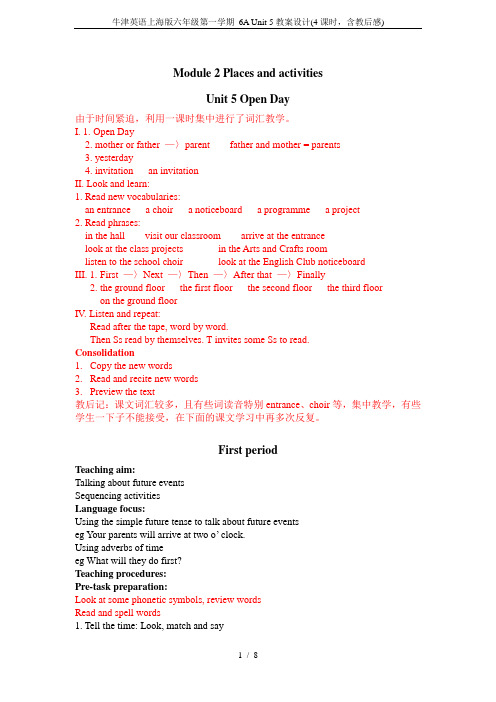
Module 2 Places and activitiesUnit 5 Open Day由于时间紧迫,利用一课时集中进行了词汇教学。
I. 1. Open Day2. mother or father —〉parent father and mother = parents3. yesterday4. invitation an invitationII. Look and learn:1. Read new vocabularies:an entrance a choir a noticeboard a programme a project2. Read phrases:in the hall visit our classroom arrive at the entrancelook at the class projects in the Arts and Crafts roomlisten to the school choir look at the English Club noticeboardIII. 1. First —〉Next —〉Then —〉After that —〉Finally2. the ground floor the first floor the second floor the third flooron the ground floorIV. Listen and repeat:Read after the tape, word by word.Then Ss read by themselves. T invites some Ss to read.Consolidation1.Copy the new words2.Read and recite new words3.Preview the text教后记:课文词汇较多,且有些词读音特别entrance、choir等,集中教学,有些学生一下子不能接受,在下面的课文学习中再多次反复。
- 1、下载文档前请自行甄别文档内容的完整性,平台不提供额外的编辑、内容补充、找答案等附加服务。
- 2、"仅部分预览"的文档,不可在线预览部分如存在完整性等问题,可反馈申请退款(可完整预览的文档不适用该条件!)。
- 3、如文档侵犯您的权益,请联系客服反馈,我们会尽快为您处理(人工客服工作时间:9:00-18:30)。
Unit 5 Open DayTasks in this unitTalking about future events; planning events; sequencing activities; writing invitations; reading captions; writing a description of events.Period OneLanguage focus:Using the simple future tense to talk about future eventse.g., Your parents will arrive at two o’clock.Using adverbs of timee.g., What will they do first?Language skills:ListeningRecognize the difference in the use of intonation in questions, statements (including approval) and commands, and respond appropriatelySpeakingUse appropriate intonation and stress to convey intended meanings and feelings ReadingRead written language in meaningful chunksWritingDevelop written texts by expressing own ideasMaterials:1.Student’s Book 6A page 322.Workbook 6A pages 28 and 293.Cassette 6A4.Cassette playerPre-task preparationAsk the students: What do we do on Open Day? What do parents do? Write a list on the board as the students mention activities.Play the cassette for Look and learn. The students repeat.While-task procedure1.Give the students time to read Look and read silently.2.Play the cassette. The students follow in their books.3.In groups of six, students practise the dialogue. Select groups to read thedialogue.4.In pairs, students complete the programme with the correct time.5.Ask questions about the programme: e.g., What time will the parents arrive?What will they do first/next/then/after that/ finally? When?6.Select other groups to read the dialogue.7.Ask further questions: e.g., Where will they meet their parents? What willthey look at in the classroom and Arts and Crafts room> What will they do in the hall? What will they look at in the library? What will they have in the Music room?8.Consolidation:Workbook 6a page 28-29Period TwoLanguage focus:Using the simple future tense to talk about future eventse.g., I’ll be in classroom 6ALanguage skills:ListeningListen for specific informationSpeakingMaintain an interaction by agreeingReadingRead written language in meaningful chunksMaterials:1.Student’s Book 6A page 332.Workbook 6A pages 313.Cassette 6A4.Cassette playerPre-task preparationReview: ground/ first/second/third/ floor. Ask: Where is the library/hall/ Arts and Crafts room? To elicit: e.g., It’s on the first floor.While-task procedure1. Give the students time to look at the floor plan of the school. Ask individual students to read the names of the rooms. Ask: Where is the Arts and Crafts room? To elicit: It’s on the third floor.2. Play the cassette for Look and Listen. The students listen. Ask: Where will kitty be? To elicit: She’ll be in the Arts and Crafts room.3. Select students to be Kitty, Peter, Alice and Jill. Ask: Where will you be, Kitty? To elicit: I’ll be on the third floor.4. In pairs, students practise Ask and answer.5. Workbook 6A page 31a. Give the students time to look at the pictures.b. Play the cassette. The students listen and match.ConsolidationWorkbook 6A page 32Period ThreeLanguage focus:Using the simple future tense to talk about future eventse.g., What will our parents do first?Using formulaic expressions to begin and end a lettere.g., Dear…; YoursLanguage skills:ListeningIdentify details that support a main ideaSpeakingMaintain an interaction by replyingReadingRecognize format and language features when reading non-narrative texts WritingDevelop written texts by using appropriate format, conventions and language featuresMaterials:1.Student’s Book 6A page 342.Workbook 6A pages 32, 343.Cassette 6A4.Cassette playerPre-task preparationTalk about invitations. Ask: When do you send invitations? To elicit: e.g., for a birthday party. Try to get the students to mention other occasions.While-task procedure1. Read the outline of the dialogue in Plan and speak.Ask the students to suggest a list of five activities. Write them on the board.2. In pairs, students decide on the activities and complete the programme. They then practice the dialogue.3. Ask individual students about their programme using the questions in Plan and speak. q5 The students complete Read an write. Ask one or two students to read their completed reports.4.Give students time to read Read, think and write. In groups, students discuss how to complete the invitation. Ask a representative from each group to rea their invitation.5.The students write the invitation to their parents. Ask individual students toread their invitations.ConsolidationWorkbook 6A pages 32, 34Period FourLanguage focus:Using the simple past tense to talk about past activitiese.g., The parents arrived at Rose Garden School at two o’clock.Language skills:ListeningListen for specific informationSpeakingMaintain an interaction by replyingReadingIdentify details that support a main ideaWritingDevelop written texts by presenting main and supporting ideasMaterials:1.Student’s Book 6A page 352.Cassette 6A3.Cassette playerPre-task preparationIntroduce the past forms of the verbs on this page. Write the verbs on the board; arrive- arrived; visit- visited; look-looked; listen- listened; have- had. Ask: What time did you arrive at school? To elicit: e.g., I arrived at school at eight o’clock. Continue with: When did you visit your grandparents? When did you look at the noticeboard? What time did you have your breakfast?While-task procedure1 Give the students time to look at the pictures in Read and Match.2 Play the cassette. The students listen. Play the cassette again. The students repeat.3. In pairs, students match the pictures and sentences. Ask individual students to read a sentence in the correct order.ConsolidationCopy the new wordsRecite the passage.。
